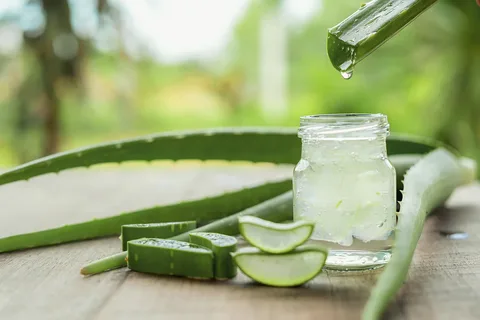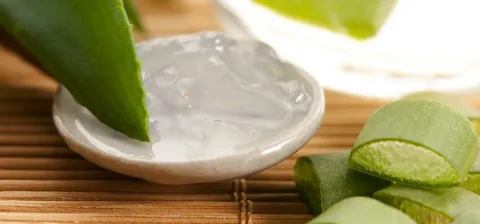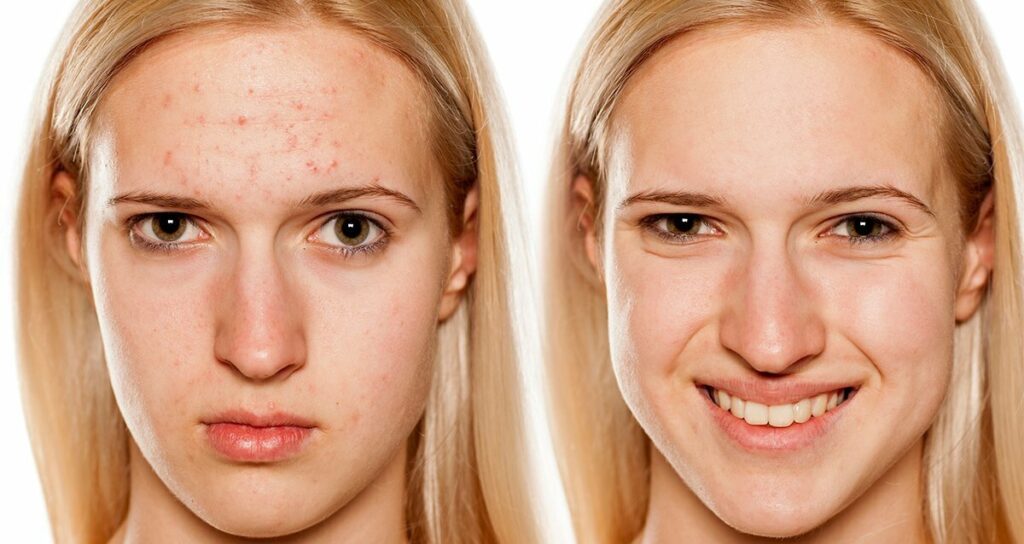Effective Natural Products for Treating Acne Scars

1. Introduction to Acne Scars and Natural Remedies
In this current paper, we have divided various mushrooms, plants, and marine organisms that are cited in the literature, and claimed to have anti-acne scar effects.
Currently, the treatment for this event consists of surgeries and other substances like retinoids that can aid in the recovery of the contours of the skin. However, teratogenicity, depressant effects of the drug may ensue when the system is flooded with the drug for a long time. Hence, medicines and other natural agents used in the management of acne scars are a viable intervention channel for everyone with skin scarring challenges.
Acne is a recurrent superficial inflammatory condition that develops following an increase in lipid density on the skin’s surface. It is a highly unpleasant disorder that impacts on the face, chest, and back, among other areas. Acne scars are common among people who have a lot of inflammation, as papules, pustules, and nodules are involved where skin is injured.
Thus, hypertrophic scars and keloids influence the morale and facial profile during their development. Furthermore, being non-healing structures, scars are always associated with a certain decline in quality of life.
2. 1. Aloe Vera

In addition, it is capable of reducing the extent of the appearance of acne scars. Many scientists have indicated that salicylic acid present in aloe vera gel has the ability to reduce accumulated collagen and create new collagen formation. Therefore, the occurrence of acne scars results in their healing and disappearance at an earlier stage in the future.
In the case of aloe vera, choline helps reduce the skin spots that are associated with the sun, resulting in lighter skin. Moreover, vitamin C and E shield the skin against injurious effects of the sun. The aloe vera gel has also has antioxidant and antibacterial properties, and helps improve the immune system and the healing system of the body as well.
As it contains sulphur, it’s an exfoliate to offer a physical course to cells or dead cells if the skin newly forms. In addition, sulphur also brings new growth. Finally, once new cells have been created, aloe vera is also beneficial in decreasing the likelihood of scarring on the skin.
Aloe vera gel is extracted from the freshly cut bottoms of the Aloe barbadensis Miller plant. This is in a greenish form when in plant form, though changes to gel or juice upon extraction from the leaves. The actual gel contains nutrients like vitamin E, C, and A, choline, bisabolol, and salicylic acid that play a role for skin care.
The ingredients of this gel are moisturizing and antioxidant, which have an effect on the skin, sending signals to improve. It also has a function of somehow covering the skin and at the same time, it is a moisturizing product that does not leave the skin oily. Now, aloe vera gel is an anti-inflammatory and antibacterial that heals acne and reduces the appearance of discolorations.
This cream has both salicylic acid and sulfur in its composition and these are two common substances used in scar treatment. It is also suitable for use by people with oily and / or acne skin type. In its anti-inflammatory function, it is useful in reducing inflammation, reddening and swelling of the skin. Essentially, aloe vera is a natural moisturizer and that helps to moisturize the skin and also render the skin flexible. It is full of antioxidants and minerals that help in the process ofwound healing.
Also Read: A-closer-look-at-blackheads-vs-whiteheads-causes
2.1. Benefits of Aloe Vera for Acne Scars

Furthermore, it is able to diminish the visibility of acne scars. The salicylic acid in aloe vera gel breaks down the accumulated collagen and promotes new collagen growth. Thus, acne scars heal and disappear sooner over time. Choline in aloe vera diminishes the skin spots due to sun exposure, leaving the skin lighter. In addition, vitamin C and E protect the skin against harmful sun damage.
The aloe vera gel also has antioxidant and antibacterial properties, which enhance the body’s immune function and promote healing. Since it contains sulphur, which is a natural exfoliant to provide cells with a physical process or remove the dead cells when the skin forms new. Furthermore, sulfur also provides renewed growth. Lastly, once new cells have formed, the skin enjoys aloe vera’s healing qualities to reduce scarring.
Aloe vera gel is derived from the leaves of Aloe barbadensis Miller. It has a green color while it is in plant form, but it is converted to a gel or juice after being extracted from the leaves. The aloe vera gel is rich in vitamins and minerals, such as vitamin E, C, and A, as well as choline, bisabolol, and salicylic acid that contribute to its effective skin care benefits.
This gel contains moisturising and antioxidant agents that affect the skin in a positive way. It also acts as a protective layer on the skin and helps replenish its moisture without making it greasy. Aloe vera gel acts as an anti-inflammatory and antibacterial that fights acne and helps fade blemishes.
It contains salicylic acid and sulfur, which are both used extensively in the treatment of acne scars. They are also great for oily and acne-prone skin. In the anti-inflammatory function, it helps to diminish redness and swelling. Aloe vera is a natural moisturizer, it keeps the skin hydrated and improves its elasticity. It is rich in antioxidants and minerals, which accelerate healing.
3. 2. Rosehip Seed Oil
Generally, rosehip seed oil is a satisfactory emollient for the skin, but in some cases of sensitive skin, the rubbing could cause redness or itching. Thus, it is highly recommended to do a patch test prior to using this product. To use rosehip oil, apply the evening facial cleanser and apply approximately 2-3 drops of rosehip oil to clean skin, using your fingertips and in circular movements to increase the circulation of blood to the face.
If the skin is comfortable to the touch, you can apply another layer of lotion after 5 minutes have elapsed. Because of how hydrating this rosehip oil really is, you can decide to apply it to your skin bi-nightly or just a few nights in a week after it has been used for several months.
It takes time for it to begin to work, which may take longer time compared to other remedies; therefore, one has to be patient. But it is likely that you may not be let down since you are searching for terms that may have meaning in a specific context.
The natural product that is derived from rosehip seed oil is mild, offers little side effects and has the capability of improving on the outlook of the acne scar due to its skin regeneration properties. It is full of many cure-all substances, such as acids laevulins and essential fatty acids, vitamin A, vitamin C, linolenic and linoleic acids.
Such nutrients are extremely important for combating free radicals and cellular damage, consequently encouraging collagen and elastin synthesis. These ingredients lead to restorative skin effects, thus reducing the formation of the acne scars while preventing other factors causing the acne scars, even in conditions of inflamed acne and persistent redness of skin associated with inflammations.
3.1. 2.1 How Rosehip Seed Oil Helps in Fading Acne Scars
Rosehip seed oil is therefore very effective for treating acne scars. Regular application of rosehip seed oil on acne scars has been shown to significantly improve the condition of the skin. It fades acne scars and reduces acne-related pigmentation.

It also significantly improves the skin’s moisture levels and makes the skin more elastic. Furthermore, rosehip seed oil is rich in phenolics, which are known for their antioxidant properties. Therefore, the presence of phenolics in rosehip seed oil offers natural oxidation protection.
Oils with a high content of unsaturated linoleic and linolenic acid are prone to oxidation and can easily turn rancid, which is the main concern of consumers. The presence of these beneficial linoleic acids and linolenic acids can therefore be effectively protected by adding rosehip seed oil into cosmetics and skincare products such as serum, cream, treatment essence, and body lotions.
Rosehip seed oil is extracted from the seeds of a wild rose bush called Rosa moschata, which is found in the southern part of Chile. Rosehip seed oil has a high content of linoleic acid (49.9%) and linolenic acid (34.3%), which are essential for hair and skin health.
Rosehip seed oil contains natural tretinoin, which is a form of vitamin A, and the first retinoid molecule discovered in the 1970s. Tretinoin is a very effective treatment for reducing both acne and acne scars. Regular application of rosehip seed oil on acne scars has been shown to exhibit significant improvements in the appearance of the skin by fading acne scars and reducing acne-related pigmentation. It also significantly improves the skin’s moisture levels and makes the skin more elastic.
4. 3. Honey
Certain hones, such as the manuka honey, also have the capability of promoting fibroblast activity in degraded human extracellular matrix, making transformed human growth agents. The antibacterial activity tests involved the use of a hydrometer, where the results indicated that the manuka honey was effective for about 8 hours for a glycerin humectant and provided a favorable environment for tissue regeneration of the skin wounds.
The anti-inflammatory, antioxidant, and microbial activities of Melaleuca alternifolia in honey also respond to skin protection and limitation of skin damage, as well as the arrangement of dermis and epidermis layers. It was possible to observe that hypertrophic wounds seemed to be localized and the skin in burns tests demonstrated faster remodeling when the participants taped to the application site daily.
In as much as beauty treatments are concerned, honey has always been man’s first option from time immemorial, primarily due to its therapeutic value. Honey contains 81% sugars, most of which are glucose and fructose as well has numerous other compounds such as proteins, amino acids, organic acids, a few ions, manganese, chlorogenic acid enzymes, diastase, glucose oxidase, invertase, lipase, and alkaline phosphatase, and a small amount of other vitamins and other ions. 1% ash, 0. 1% potassium, and 0. 02% sodium.
It was also seen that honey has bactericidal activities, which would also qualify it for use in scar treatment—acne scar in particular. The primary uses that honey offers to skin are anti-inflammatory, antibacterial water, a skin’s moisture sealant, rich in antioxidant, aiding in wound rejuvenation, being a pH balancer and nourishing exfoliation to the skin.
4.1. 3.1 Antimicrobial Properties of Honey for Acne Scars

Honey a natural substance which is produced by bees and directly from nectar of plants, has long history in the treatment of wounds and been submitted to possess antimicrobial, anti-inflammatory and wound healing properties. Honey has antibacterial components of a non-specific and direct pathogen killing activity. Topical application of it was found efficiently inhibit microorganisms’ growth as S. aureus, P. aeruginosa, and other bacteria in vitro, multidrug-resistant bacteria and fungi originated from infected skin as in vivo.
All these antimicrobial effects are mainly due to its physical characteristics and low pH, as well as the high osmolarity-agreeability of glucose, fructose and water. In addition, honey has an antioxidant activity, which is useful in repairing of wounds and honey has been suggested as a player in declining of ROS, leading to an anti-inflammatory activity. Furthermore, honey has small antimicrobial molecules, so it includes peptides and proteins that have an impact on the activity against bacteria, for example, bee defensin-1 and jelleins.
5. 4. Lemon Juice

A diluted lemon juice is okay to the skin, but when you use it in its concentrated form, it can cause soreness of the skin or worsen a skin disease, dry skin, oily skin, and skin that easily burns in the sun. However for the case where one has to apply a diluted mixture of one tablespoon of fresh lemon juice and one tablespoon of water, the situation is different.
This will reduce skin rawness while at the same time having the action against acne as earlier pointed out. Besides, they also reduce likeliness of developing contact dermatitis. However, if the reactions, such as stinging or burning sensations, persist, rinse the skin with water and use another remedy. Heelanization, scrubbing, or protection with sunscreen or not exposing oneself to heat for one week after the procedure is necessary to protect the skin.
The above does not apply to all users; in fact, it only applies to a few or specific users or a user group. Several report that the ‘no post-application treatment being required’ was true. Accordingly, decide on a dermatologist or other healthcare professionals for other credible options that are different from a certain therapy. It would be highly recommended that proper test be done on the sensitivity and effectiveness on the acne before the experiments can be done.
Anti-blemish and skin lightening properties can be attributed to lemon’s alpha hydroxy and citric properties; vitamin C; and natural lightening and bleaching compounds. They offer huge advantages in the management of acne scars. Alpha hydroxy acids help in exfoliation of the damaged skin and collagen, so, it stimulates the generation of new skin cells.
The citric acid performs functions of a scrub, lightens the skin tone and reduces the appearance of wrinkles. Besides, lemon juice acts as a skin lightener due to the presence of the natural bleach compound, thus promoting growth of healthy skin. Because of the bleaching property of the lemon, scars fade dramatically with time as one continues to use the memory.
Lemon juice contains vitamin C which plays a major role of acting as a forming agent for collagen, the main protein found in skin whose role is to repair and replace the damaged skin tissue. The inclusion of these components will assist in the elimination of the acne scars from the face much more efficiently.
5.1. 4.1 Caution When Using Lemon Juice for Acne Scars
Today there are many creams, gels, and other products that include lemon or lime in their components or use lemon or lime juice and they are applied for skin bleaching and in fighting acne. In this case, apparently, applying such a product does not have any form of effect on the body since some of the products utilized in the production of the product tested have no negative impacts.
Lemon use in the home also has adverse effects, after applying the lemon juice, do not sleep because it will affect your face. It is not advisable to leave lemon juice on the skin at night because if the skin is in contact with lemon juice (and thus citric acid) and exposed to sunlight (preferably UVB and UVA), both of the immediate photoirritation as well as photoaging (pigmentary changes after the reaction, which may take months to years to resolve) become more probable. Skin rash, itching, or hives may happen; hence, stop the use of lemon and stay out of the sun for the next few days.
Lemon is commonly applied as a natural cure to alter the skin color—particularly to make it fair—and to treat spots, including acne. However, if you are having sensitive skin or facial skin allergy to lemons, then it is recommended not to use lemon. The photo toxicity of lemon and lime, as mentioned earlier, is caused by citric acid, which raises the amount of sensitivity of the skin to the sun leading to ; redness, swelling, discomfort, and or blisters.
This condition may develop a few hours to a few days after exposure to light. Always use protective clothing if you have to go out, For the best result, if you have to use lemon or lime on your skin, do not go out and expose the skin to sunlight for at least three days. When going outside, you need to wear a sunscreen of at least 30SPF if you do not want the cancer cells to multiply. And, if you are swimming or sweating, then you must again apply sunscreen after every two hours.
6. Conclusion: Effective Natural Products for Treating Acne Scars
This research has then used literature review to come up with this list of commercially available multi-beneficial natural product. These have been enumerated in one format or the other given the challenge of acne in the society today. Specifically, various commercial natural products recognized to possess anti-acne, anti-inflammatory/emollient, and /or wound healing potential have been found to possess the potential of controlling Propionibacterium acnes infection and acne formation.
These products are in a form where the user can quickly apply them when using them, and they are natural, non-irritating and non-toxic with smart benefit structures that greatly minimize individual discomforts as one gets valued skin benefits. Thus, this work presented a reliable assessment that has stemmed from a synthesis of current literature review and case findings.
It can also be employed by the dermatologists as well as the users as a quick guide to determine the effectiveness of the acne natural products that are produced differently by various brands that contain excellent acne fighting and other skin benefits. Additional defects of other natural acne products may be complemented if the list was expanded referring to the new features, referring to various clinical trials and various case histories.
It is believed that boosting these natural compounds has made it possible to develop natural products for controlling acne. In contrast to a single sort of acne, various natural anti-acne products can focus on all stages in relation to acne formation and therefore prevent eruption of acne. In addition, natural acne products are cheaper and more friendly to the environment as opposed to synthetic commercial counterparts.
They are also non-irritant and non-carcinogenic and are more readily metabolised by the skin. Indeed, these natural products used in acne fighting contain other valued functions that include better detoxification, increased energizing, fresh fiber structure, reduced nucleic acid content, lighter and more translucent skin, shiny and moist skin, slow blood vessel degeneration and improved skin anti-aging.
Pingback: Effective Methods for Removing Dark Spots on the Face